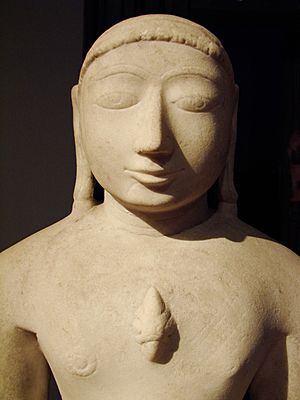Karma facts for kids

Karma (say "car-ma") is an old word from Sanskrit. It means that your actions have consequences. It also refers to the actions themselves. This important idea appears in many religions and philosophies. It basically teaches that what you do comes back to you. Think of it like a boomerang: what you send out into the world will return.
Karma is more than just simple cause and effect. It's about the energy you put out. Kind actions, helpful deeds, and positive thoughts create good karma. This can lead to good things happening in your life. On the other hand, unkind actions, mean words, and negative thoughts create negative karma. This can lead to less positive experiences.
Contents
What Is Karma and How Does It Work?
Karma is not a simple math problem like "good deed equals good outcome." Several things affect how karma plays out in your life.
Why Your Intentions Matter
Your intentions are very important! If you accidentally hurt someone, the results might be less serious. This is different from when you hurt someone on purpose. The energy behind your action is a key part of the karma equation.
The Impact of Your Actions
Of course, the action itself also matters. A small act of kindness can still create good karma. A major act of unkindness will likely have bigger negative results.
How Consequences Appear
The results of your actions can show up in many ways. They might happen right away, or they might take time to appear. Sometimes, the results are clear. Other times, they are more subtle and might not seem directly linked to what you did.
Finding Balance in Your Actions
The goal of karma is not to collect many "good karma points." Instead, the idea is to aim for balance. You want to do more positive actions and fewer negative ones. This journey toward balance is a lifelong process of learning and growing.
Karma in Your Daily Life
You do not need to be religious to understand karma. Thinking about what might happen because of your actions can help you make better choices. Look at these examples:
- Helping a friend: If you help a friend who is having a hard time, you will likely feel good. Your friend will also be thankful for your help. This positive energy can lead to good experiences for you later.
- Being kind to strangers: A simple smile or a kind act toward someone you do not know can make their day better. It can also make your day better. These small acts create waves of positivity.
- Being honest: Telling the truth, even when it is hard, builds trust and integrity. Being honest often leads to stronger relationships. It also gives you a greater sense of personal well-being.
- Learning from mistakes: Everyone makes mistakes. The important thing is to learn from them. Try to avoid repeating negative behaviors. This process of self-improvement is a form of positive karma in action.
Modern Ideas About Karma
Today, people often understand karma in different ways. Some see it as a spiritual law of cause and effect. Others see it as a psychological principle. This means our actions shape our experiences and relationships. No matter how you see it, the main idea stays the same. Our actions have consequences. Trying to act in positive and helpful ways often leads to a more fulfilling life.
Activities to Learn About Karma
- Keep a kindness journal: Write down all the kind things you do. Also, write down the kind things others do for you. Notice how good it feels to be kind and to receive kindness.
- Practice mindfulness: Pay attention to your thoughts and actions throughout the day. Notice how negative thoughts and actions can affect your mood and how you interact with others.
- Read stories about karma: Many stories, from old fables to modern children's books, show the ideas of karma. They do this in interesting and memorable ways.
Related Pages
- Just-World Phenomenon is similar to Karma.
Images for kids
-
The lotus flower often represents karma in many Asian traditions. A blooming lotus flower is special because it holds seeds inside itself while it blooms. The seed is like the cause, and the flower is the effect. The lotus also reminds us that we can grow, share good karma, and stay pure even in difficult situations.
See also
 In Spanish: Karma para niños
In Spanish: Karma para niños
 | Aurelia Browder |
 | Nannie Helen Burroughs |
 | Michelle Alexander |







